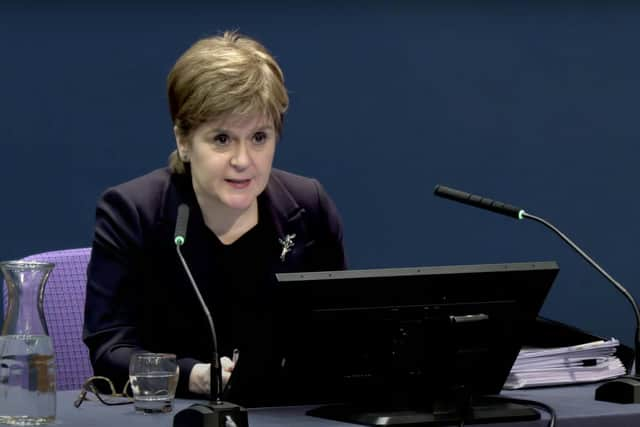Nicola Sturgeon denies secrecy and political motives during emotional evidence to UK Covid Inquiry
Nicola Sturgeon denied adopting a secretive approach during the pandemic and insisted she did not seek to use the crisis to her political advantage as she occasionally fought back tears while giving long-awaited evidence to the UK Covid Inquiry.
The former first minister admitted deleting WhatsApp messages despite previously indicating to journalists that she would hand them over, but insisted she only “very rarely” used the mobile app with a “handful” of people.
Advertisement
Hide AdAdvertisement
Hide AdElsewhere, she rejected accusations the pandemic response was run on her “instincts”, or that she had “carte blanche” to make decisions without the approval of her wider Cabinet.


Aamer Anwar, the lead solicitor for the Scottish Covid Bereaved group, accused Ms Sturgeon of the “industrial deletion” of WhatsApps and said it ought to have been “blindingly obvious” that such contemporaneous messages may be relevant.
Ms Sturgeon told the inquiry she had not thought “less” about politics and independence than she did during Covid. “I want to say to people, and give this inquiry an assurance, that none of those decisions were influenced in any way by political considerations or by trying to gain an advantage for the cause of independence,” she said.
Senior UK minister Michael Gove previously suggested to the inquiry that Ms Sturgeon sought to diverge from the UK government at certain points during the pandemic to advance the SNP’s “political agenda” of destroying the union.
Ms Sturgeon said she would “strongly” reject accusations of politicising the pandemic. Visibly emotional, she said: “I take it very, very personally when people question the very motives because I know the motives were absolutely in good faith and for the best reasons.”
Earlier, the former first minister fought back tears as she admitted “a large part” of her wished she was never first minister during the Covid crisis. “At times in those early days I felt overwhelmed by the scale of what we were dealing with, and perhaps more than anything I felt an overwhelming responsibility to do the best I could,” she said.
"The idea that in those horrendous days, weeks, I was thinking of a political opportunity I find – well, it’s just, it wasn’t true.”
In a bruising closing exchange following a full day of evidence at the inquiry, which has been sitting in Edinburgh for three weeks, lead counsel Jamie Dawson KC put a series of accusations to Ms Sturgeon. “The story of Covid in Scotland is the story of the hubris of Nicola Sturgeon, is it not?” he concluded.
Advertisement
Hide AdAdvertisement
Hide AdMs Sturgeon responded: “No. I do not believe that to be the case. I am in the fortunate position of not having lost anyone to Covid. I wish with every fibre of my being that the decisions my government had been able to take could have reduced the number of people in Scotland who did lose someone to Covid.
“I am deeply sorry to each and every bereaved person, and each and every person who suffered in other ways. I did my best, my government did our best and people will judge that. But I know that every day I tried my best and those working with me tried their best to steer this country through the Covid pandemic in the best way we could.”
Ms Sturgeon had previously told the inquiry that work on independence was not restarted during the pandemic, despite minutes from a Cabinet meeting in June 2020 saying “consideration” should be given to this.
The inquiry was also shown an email – copied to the-then first minister and a number of senior figures – sent in July 2020 and connected to a meeting invite issued by the office of Ms Sturgeon’s former deputy John Swinney, but signed off by someone named Scott, which raised concerns about restricting travel to Spain.
“It won’t matter how much ministers might justify it on health grounds, the Spanish government will conclude it is entirely political; they won’t forget; there is a real possibility they will never approve EU membership for an independent Scotland as a result,” the email read.
Ms Sturgeon said independence was not a factor in decision-making, and she had no discussions of that nature. The Scottish Government later said the email was sent by a civil servant and not anyone communicating on Mr Swinney’s behalf.
Elsewhere, Ms Sturgeon denied the Scottish Government “adopted an approach of secrecy” in the early stages of the pandemic. However, she said with hindsight she would have taken a different decision around the disclosure of an outbreak at a Nike conference in Edinburgh in February 2020.
Dr Catherine Calderwood, the former chief medical officer, had told the Scottish Government the outbreak should not be disclosed on grounds of patient confidentiality.
Advertisement
Hide Ad